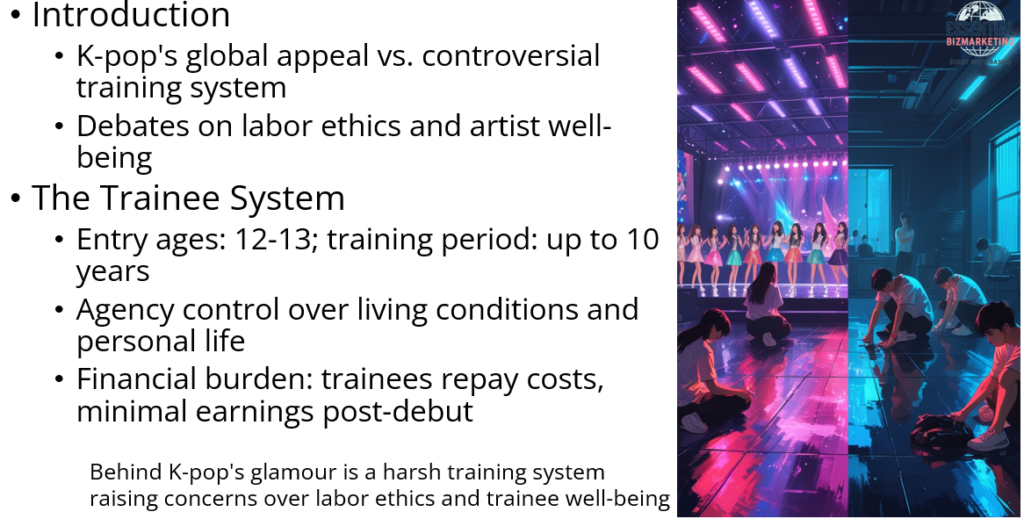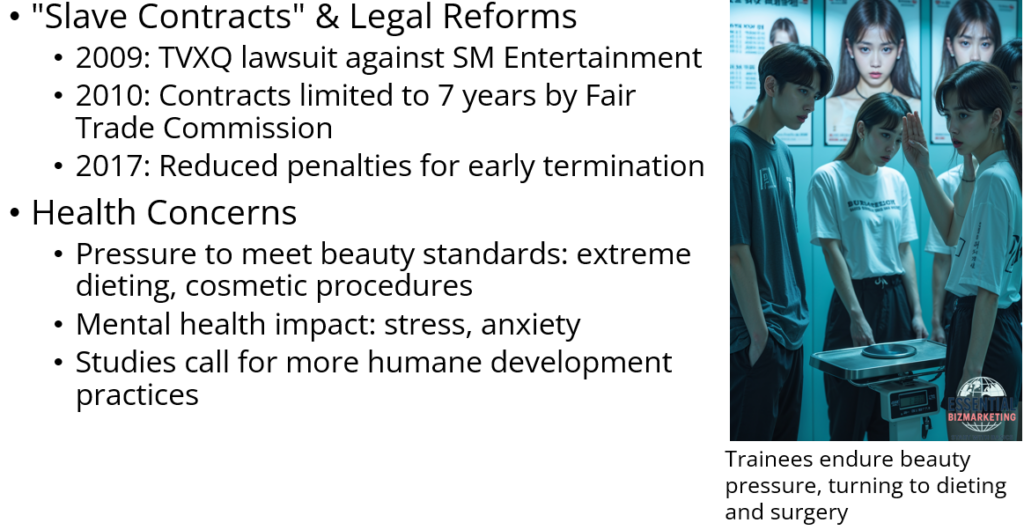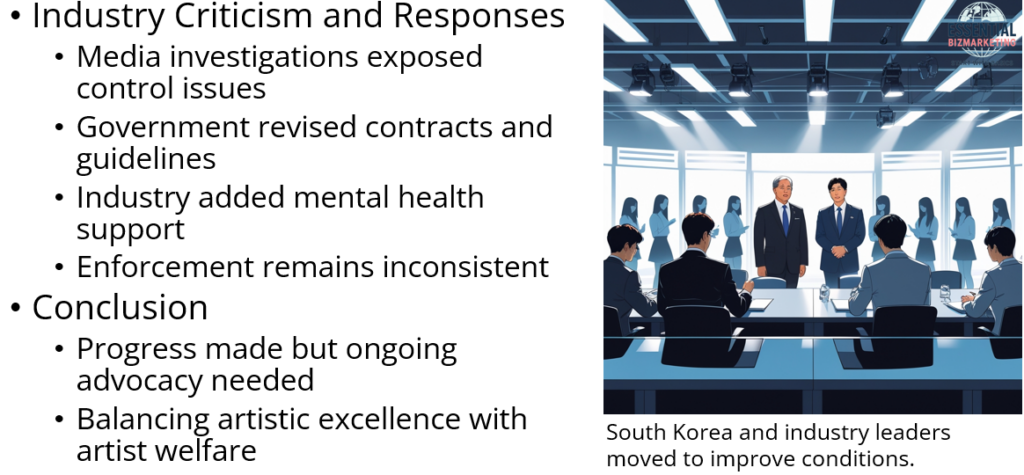Introduction: The Allure and Shadows of K-pop

K-pop, South Korea’s vibrant music genre, has captivated global audiences with its polished performances and catchy tunes. However, beneath the glamorous exterior lies a rigorous training system that has sparked debates about labor ethics and the well-being of aspiring artists.
The Trainee System: Pathway to Stardom or Modern-Day Servitude?
Aspiring K-pop idols, often starting as young as 12 or 13, enter into trainee programs under entertainment agencies. These programs involve intensive training in singing, dancing, and foreign languages, sometimes lasting up to a decade. Trainees typically reside in company-provided dormitories, where agencies exert significant control over various aspects of their lives, including diet, personal relationships, and daily routines. Financially, trainees are often burdened with debt, as they are required to repay the costs of their training, living expenses, and other related expenditures, leading to minimal earnings even after debuting as idols.
“Slave Contracts”: The Legal Battle for Fair Treatment

The term “slave contract” emerged to describe the exploitative agreements between idols and their agencies. A notable case in 2009 involved three members of the boy band TVXQ, who sued SM Entertainment over a 13-year contract they deemed excessively restrictive and financially unjust. This lawsuit prompted South Korea’s Fair Trade Commission to intervene, resulting in a 2010 ruling that limited entertainment contracts to a maximum of seven years. Further reforms in 2017 aimed to reduce financial penalties for early contract termination and prevent agencies from forcing contract renewals, marking significant strides toward protecting artists’ rights.
Mental and Physical Toll: The Hidden Costs of Fame
The demanding nature of the trainee system has raised concerns about the mental and physical health of young artists. Reports indicate that trainees face immense pressure to conform to stringent beauty standards, often resorting to extreme dieting and cosmetic procedures. The relentless pursuit of perfection can lead to stress, anxiety, and other mental health issues. A study analyzing the ethical challenges in the Korean music industry highlighted these concerns, emphasizing the need for a more humane approach to artist development.
Industry Criticism and Institutional Responses

Beyond individual lawsuits, public discourse around K-pop labor ethics has intensified through investigations by journalists, researchers, and civic organizations. Documentaries and exposés from outlets such as the BBC and The Korea Herald have revealed the psychological strain and excessive control many idols endure, from limited personal freedom to enforced dieting and overwork. In response, the South Korean government and entertainment industry stakeholders have taken steps to improve working conditions. The Fair Trade Commission has revised standard contract templates to ensure greater transparency and more equitable terms. Moreover, the Ministry of Culture, Sports and Tourism has implemented artist protection guidelines, encouraging agencies to provide mental health resources and regular rest periods. While enforcement remains inconsistent, these policy-level shifts signal growing recognition of the need for structural reform within the entertainment labor system.
Conclusion: Navigating the Path Forward
The controversies surrounding K-pop idols’ training conditions highlight the complex intersection of cultural expectations, economic interests, and individual rights. While the industry has made progress in addressing some of these ethical concerns, ongoing vigilance and advocacy are essential to ensure that the pursuit of artistic excellence does not come at the expense of young artists’ well-being.
📚 References
BBC. (2024, October 9). Hit BBC K-Pop show ‘Made In Korea’ set for second series to rival Simon Cowell’s show – but there’s a twist. The Sun. https://www.thesun.co.uk/tv/30976749/bbc-made-in-korea-simon-cowell/
Crystal, T. (2020, March 29). Exploding the myths behind K-pop. The Guardian. https://www.theguardian.com/global/2020/mar/29/behind-k-pops-perfect-smiles-and-dance-routines-are-tales-of-sexism-and-abuse
Hanni calls at parliamentary hearing for better treatment of artists. (2024, October 15). Reuters. https://www.reuters.com/world/asia-pacific/k-pop-star-calls-parliamentary-hearing-better-treatment-artists-2024-10-15/
Idols & ideals: Ethical challenges in the Korean music industry. (2023). Aalto University. https://aaltodoc.aalto.fi/bitstreams/08f8628b-1962-4380-9e95-f0522f5c7b8f/download
K-pop. (2025). In Wikipedia. https://en.wikipedia.org/wiki/K-pop
The Korea Herald. (2023, December 31). [2023 K-pop in a nutshell] From Moonbin’s death to Fifty Fifty’s legal battles. https://www.koreaherald.com/article/3292129
Slave contract. (2024). In Wikipedia. https://en.wikipedia.org/wiki/Slave_contract
